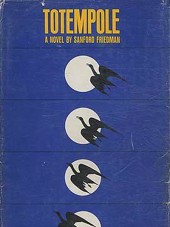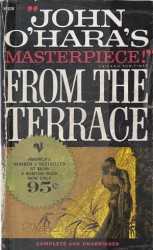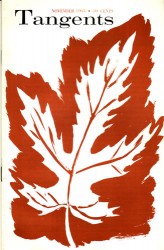 Totempole
Totempole
by Sanford Friedman
Published by E. P. Dutton & Co., New York
Published 1965
Reprinted by North Point Press, April 1984.
Fiction: coming of age
411 pages • Find on Amazon.com
Book Review by Ross Ingersoll as “Marcel Martin”
As originally printed in the Nov. 1965 issue of Tangents
It’s no secret that the “gay” novel has long been a sorry thing. It has rarely been literary — often not even literate — and rarely profound; it has usually been defensive or sentimental, if not offensive and down-right trashy. Guilt ridden and fearful of the censor’s wrath if sin were to go unpunished, it has often been unnecessarily tragic and hopeless. There have, indeed, been a few (particularly those written by British writers) which have avoided some of these faults but have not avoided them all. The great homosexual novel has not yet been written, and, in my opinion, it cannot and will not be. This does not mean that there will not one day be a great novel with a homosexual protagonist. A few years ago this seemed a vain hope, but as our and society’s attitudes toward homosexuality change and as the freedom to write and to publish books about this once tabooed aspect of human life increases, it becomes increasingly evident that there is no valid reason why there can’t be a great novel about a homosexual or homosexuals.
There are real difficulties to be overcome. Can a heterosexual (who, we must assume, is a good writer) no matter what his tolerance and powers of observation, really write an honest novel about homosexuality? This, I doubt. Can a sensitive observant, and talented homosexual, capable of distinguished writing for a conventional press, dare write what, if it is be of any value, must be a self-revealing account? There seems to be increasing evidence that today he can. There still remains the problem of perspective.
The primary trouble with the “gay” novel has usually been that the author has chosen to regard homosexuality as the only “raison d’être” of his novel and has made it the backdrop against which the entire drama of his novel has been played. Often the writer has been obsessed with homosexuality as such and has interpreted all life as seen through this obsession. If he has been a heterosexual he has usually been seeking either to display his own tolerance and his powers of observation of an alien world, or, if he has been a homosexual, he has attempted only to portray the compulsive agony, relieved here and there by physical pleasure, of a homosexual destiny which dictates every act of an innocent victim’s life.
Neither approach can produce a satisfactory novel. Important as sex may be in our lives, essential as it may be for our well-being and happiness, it is not all there is to life. Sexuality, whatever it may be, exists only against the backdrop of life itself. Food and shelter, companionship, affection, ambition, and achievement are still present. We must live before there can be sex of any kind.

Let us, for a moment, consider a “heterosexual novel.” I can think of no modern novel in which there is more “sex” than there is in John O’Hara’s From the Terrace. Even so, every sex scene, the preoccupation with sex itself, is laid against the backdrop of the characters’ lives; sex may make the novel spicy, but it’s the social, economic, political factors and the personal relationship of the characters which make the novel. No matter what your personal opinion of From the Terrace as literature, my personal point is that it has never occurred to anyone to characterize it as a “heterosexual” novel. The very idea seems absurd.
Is there any reason why homosexual characters should not be just as interesting as people as anyone else? The fact is that they can be, and there should be no reason why a great novel cannot be written about them. Today any writer is free to accept homosexuality as another of life’s interesting phenomena and, like heterosexuality, as a way of life, and then to proceed unselfconsciously to deal with life itself, for life not sex is what great novels are made of.
There have been at least two books in the last few years which prove that this opinion of mine is sound. No one can possibly call James Baldwin’s Another Country a “gay” novel, yet it contains some of the boldest and best writing about homosexual relationships and one of the most moving homosexual sex scenes I have yet read. No one has characterized Last Exit to Brooklyn a “gay” book, yet it treats of homosexual situations and characters with a frankness and honesty new even to this generation. These are not gay books for the simple reason that in neither does the author make an issue of homosexuality; it’s just there, to be dealt with, as might be any other facet of life, as capably as the artistic ability of the author permits.
With this criterion in mind the best thing I can say about Totempole is that it is not a gay novel. This is not to damn with faint praise; it is a fine novel, literate, astute, psychologically sound, and, best of all, eminently readable. Anyone will find it difficult to lay aside. Not only is Totempole not “gay” it is not really a novel. It is, rather, a series of vignettes, any one of which could, and two of them have, been published separately as short stories or novelettes. Each deals with a certain period, beginning with almost babyhood, in the life of Stephen Wolfe, the second son of a well-to-do, if not wealthy, Jewish family.
It is essential to point out here that the family is Jewish, for everything that happens to Stephen is conditioned by his Jewish background. If one has been forewarned by the jacket blurbs or reviews, the symbolism of even the first chapter cannot be overlooked. It is obvious that Stephen’s nascent sexuality is of primary interest.
It is, perhaps, unfortunate that there are blurbs and reviews, for Mr. Friedman is subtle and without them the reader might have the pleasure of discovering the symbolism for himself somewhat later. Each episode deals with a period in the development of Stephen’s sexuality and its contribution to his eventual total personality. Each period is skillfully related to a particular symbol and the collection of symbols forms the totempole of Stephen’s life. The figurative totempole is, itself, related to a “real” totempole which plays an important role in Stephen’s development.
That Stephen turns out to be homosexual seems both natural and incidental. We’re never told that he is homosexual, as a matter of fact, but the climax of the novel which brings Stephen peace of mind and an acceptance of his body, his personality, and, presumably, a way of life, is a homosexual love affair with a Korean doctor in a prisoner-of-war camp in South Korea. The love affair is described with sensitivity and with a detail and frankness still new to homosexual literature.
To me Totempole’s greatest fault is what I consider a lack of balance. Stephen is much more interesting at eighteen or twenty-two than he is at two, or six, or nine, yet the greater part of the novel is devoted to these early years. Of course, it is only in the total collection that this imbalance becomes noticeable. As separate stories each would have been perfect in itself. Much, much too much space is given to the drama of Stephen’s traumatic experiences with masturbation. True, realistic, and nostalgically painful as this episode may be it is too long in proportion to the novel as a whole.
This is a fascinating book no matter what one’s own sexual orientation. It is a landmark both in the destruction of the “gay novel” and an important step toward the creation of a literature about homosexuals.


